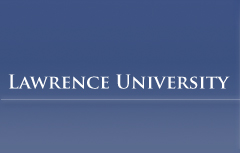Document Type
Press Release
Publication Date
7-10-2003
Abstract
Mandy Halpin’s burgeoning interest in Arabic language and human rights issues is about to get some up-close and personal attention.
Halpin, who graduated in June with a bachelor’s degree magna cum laude in religious studies, was one of 1,125 American students who were recently awarded grants by the U.S. Department of State and the J. William Fulbright Foreign Scholarship Board to study and conduct research in 140 countries throughout the world beginning this fall. She was selected as a 2003-2004 Fulbright Scholar from among more than 5,000 applicants.
In September, Halpin leaves for Morocco, where she will spend the next 10 months. The first five weeks of her stay will be spent living with a host family in Fez, where she will study Arabic at the Arabic Language Institute. In mid-October, she will move to the capital city of Rabat to begin working with Moroccan-based non-governmental organizations involved with human rights issues in the country. The Fulbright award will provide Halpin with round-trip transportation to Morocco, health insurance and a monthly stipend to cover her living expenses.
Already active in social justice and human rights issues — she’s worked extensively with the Lawrence campus chapter of Amnesty International — Halpin discovered an interest in Islam and the Arab world while completing her religious studies major at Lawrence.
With a Muslim majority, a predominantly Arabic-speaking population, an expansive history of cross-cultural interactions and a government that has shown increased sensitivity to human rights issues, Morocco provided a near-perfect destination for Halpin to pursue her interests.
“Morocco is a place where I can experience a rich Islamic culture, learn Arabic while communicating in French and explore questions of social justice and human rights,” said Halpin, who is fluent in French, which is spoken widely in Morocco. “King Mohammed VI has shown sympathy to human rights and social justice issues in recent years, establishing the Consultative Council on Human Rights. Through the cooperation of several Moroccan organizations, the National Charter on Human Rights was established in 1997. Recent parliamentary elections, in which women played an unprecedented role, have also demonstrated the primacy of such concerns.
“As a student of world religions, the whole intricate web of faith, justice and society intrigues me and I’m looking forward to exploring those connections in Morocco,” added Halpin, who lives in Boscobel. “Moroccans are striving to change their societies. I am interested in seeing how groups navigate the waters of social justice in the context of Morocco. How are they doing it and what do they want to see happen?”
To that end, Halpin intends to contact a variety of Moroccan organizations involved with social justice initiatives, among them the Moroccan Organization for Human Rights, the Moroccan Association for Human Rights, the Moroccan League for the Defense of Human Rights as well as two organizations that focus on women’s rights issues — the Democratic Association of Moroccan Women and the Union for Women’s Action.
“While I’m in Rabat, I plan to interview the local leaders of some of these organizations and observe their work whenever possible,” said Halpin. “I want to learn about the their strategies, the challenges they face and the historical, cultural and political facets influencing the problems at hand.”
Following her year abroad, Halpin plans to return to the United States to continue her Arabic studies as well as speak, write and work with nonprofit organizations here on the topics of Islamic civilizations and life in the Muslim world. Her long-range plans include pursuit of a Ph.D. in North African and Middle Eastern studies.
“I’ve studied Morocco and other post-colonial nations, Islam and Arabic literature in translation,” Halpin said. “But living in a post-colonial North African nation with a Muslim, Arabic-speaking majority will entail an entirely new set of experiences for me. I hope to come away with a much deeper understanding of Moroccan culture, the Arabic language and social justice.”
The Fulbright Program was created by Congress in 1946 to foster mutual understanding among nations through educational and cultural exchanges. Former Arkansas Senator J. William Fulbright, who sponsored the legislation, saw it as a step toward building an alternative to armed conflict.
Since its founding, the Fulbright Program has become the U.S. government’s premier scholarship program, enabling more than 250,000 American students, artists and other professionals to benefit from unique resources in every corner of the world and gain international competence.
Recommended Citation
Lawrence University, "Fulbright Fellowship Supports Lawrence University’s Mandy Halpin Exploration of Arabic Language, Moroccan Social Justice" (2003). Press Releases. 247.
https://lux.lawrence.edu/pressreleases/247
